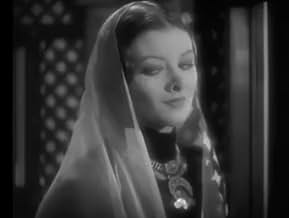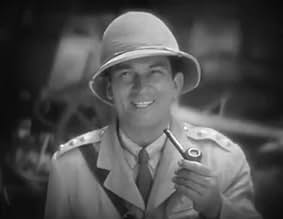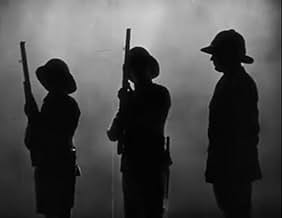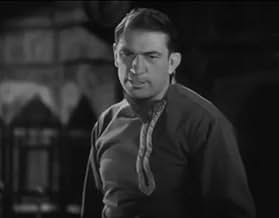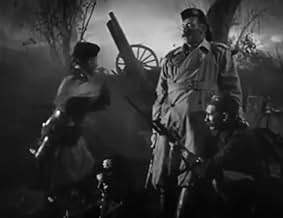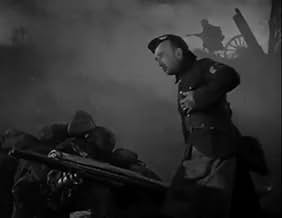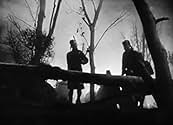Captain Donald King of the British Army goes to India just as World War I breaks out, convincing his comrades that he is a coward. In reality, he is on a secret mission to rescue British sol... Read allCaptain Donald King of the British Army goes to India just as World War I breaks out, convincing his comrades that he is a coward. In reality, he is on a secret mission to rescue British soldiers held prisoner there.Captain Donald King of the British Army goes to India just as World War I breaks out, convincing his comrades that he is a coward. In reality, he is on a secret mission to rescue British soldiers held prisoner there.
- Director
- Writers
- Stars
Claude King
- General in India
- (as Claud King)
Harry Allen
- Sandy
- (uncredited)
Frank Baker
- 42nd Highlander
- (uncredited)
William Begg
- 42nd Highlander
- (uncredited)
Arthur Clayton
- 42nd Highlander
- (uncredited)
Joseph Diskay
- Muezzin
- (uncredited)
Francis Ford
- Maj. MacGregor
- (uncredited)
Gregory Gaye
- 42nd Highlander
- (uncredited)
- Director
- Writers
- All cast & crew
- Production, box office & more at IMDbPro
Featured reviews
I find the birth of sound to be the most fascinating point in movie history. Things like widescreen cinematography and color eventually ended up dominating cinema after their introduction, but those were slow and gradual processes. Simplified, movies went from silent in 1928 to sound in 1929. It was a sea change and it happened all at once. John Ford had included some sound in a couple of previous silent films (notably Riley the Cop), and his first full talkie, a short film called Napoleon's Barber, is lost. That leaves The Black Watch as his first feature length talkie, and it's obvious that even a practiced hand like Ford was lost in this strange new world. The new technology and its inherent limitations didn't kill the film completely, but they killed parts of it for sure.
The film starts in England at a dinner for a Scottish regiment, the titular Black Watch, on the eve of their departure for France at the beginning of World War I. The field marshal (David Torrence) sends word that Captain King (Victor McLaglen) should report at once. In the earliest sign that the film has done sound all wrong, the field marshal very slowly explains the situation in India that he needs King to go and help solve. The dialogue is told in small chunks (think William Shatner when he struggled to remember his lines, but worse) with massive airs. For what essentially amounts to an exposition dump, this is painful to listen to.
From what I've read, Ford had no idea how to direct with sound. I mean, who did? It was brand new. He went with what he knew, though, and he seems to have been whispering the lines to his actors. They seem to be hearing half a sentence of dialogue from their director, speaking it, and then waiting another couple of seconds for another line. It's stilted, unnatural, and honestly hard to listen to. I don't demand realism all the time from movies, but this is the kind of unrealism that is a distraction with no narrative or cinematic purpose. If this were limited to this particular scene, it would be of limited concern. However, it's most dialogue scenes (not all), and, most damagingly, in every scene that Myrna Loy is in.
Alright, so the mission King is on is to infiltrate the army of hill people led by the mysterious female figure, held up like a goddess amongst her followers, Yasmani (Loy). King was selected because he grew up in the area while his father was stationed there, and he knows the local languages (which he never speaks, of course). He quickly meets up with an Indian officer, Mohammed Khan (Mitchell Lewis), whom King knows from his youth, and they concoct a plan with the local English officers. King is to look like he drunkenly kills a fellow officer and goes on the run, hopefully welcomed into the open arms of Yasmani.
It works, and then we get the dialogue completely undermining everything. When you have really quick and deeply felt romances in film, you have to really sell it to the audience. This is the mystical "chemistry" that pairs like Bogart and Bacall had in To Have and Have Not. I could not begin to tell you if McLaglen and Loy had chemistry, though, because literally every single line of dialogue between them is fed to them by Ford. It's two actors, taking breaths between every half line of dialogue, and speaking with great import. It becomes outright silly after a while, and it prevents any kind of emotional engagement with the scene.
The movie's not worthless, though. There are small dialogue scenes that are fine (like when King and the officer he was to have killed explain the situation to each other), and the film is often simply great to look at. It was very common in the early days of sound to not film everything with sound. You filmed with silent cameras a lot, preserving the freedom of motion and framing that you no longer got from needing to work inside a glass box. There's a particular shot, showing the Black Watch marching down a dark road in Flanders, that's absolutely gorgeous. There's also a moment where Yasmani shows the Black Watch to King through a crystal ball, and the framing is perfect so that King's younger brother fills the bottom left of the frame while King fills the top right.
The adventure elements are also fairly solid with an ending that actually engages with the situation seriously enough to be believable and has some pretty good action beats. The stuff about men dying on the battlefields of World War I in France is earnestly presented even if it ends up feeling like extra material not entirely necessary for the film.
So, the performances are largely awful (Ford's fault), but it's otherwise a thinly engaging adventure film that often looks great. This is kind of what I expected from an established director's first talkie. There's craft still there, but Ford was well within the learning curve of the new technology in a way that made the film hard to watch at times. Still, I've seen worse.
The film starts in England at a dinner for a Scottish regiment, the titular Black Watch, on the eve of their departure for France at the beginning of World War I. The field marshal (David Torrence) sends word that Captain King (Victor McLaglen) should report at once. In the earliest sign that the film has done sound all wrong, the field marshal very slowly explains the situation in India that he needs King to go and help solve. The dialogue is told in small chunks (think William Shatner when he struggled to remember his lines, but worse) with massive airs. For what essentially amounts to an exposition dump, this is painful to listen to.
From what I've read, Ford had no idea how to direct with sound. I mean, who did? It was brand new. He went with what he knew, though, and he seems to have been whispering the lines to his actors. They seem to be hearing half a sentence of dialogue from their director, speaking it, and then waiting another couple of seconds for another line. It's stilted, unnatural, and honestly hard to listen to. I don't demand realism all the time from movies, but this is the kind of unrealism that is a distraction with no narrative or cinematic purpose. If this were limited to this particular scene, it would be of limited concern. However, it's most dialogue scenes (not all), and, most damagingly, in every scene that Myrna Loy is in.
Alright, so the mission King is on is to infiltrate the army of hill people led by the mysterious female figure, held up like a goddess amongst her followers, Yasmani (Loy). King was selected because he grew up in the area while his father was stationed there, and he knows the local languages (which he never speaks, of course). He quickly meets up with an Indian officer, Mohammed Khan (Mitchell Lewis), whom King knows from his youth, and they concoct a plan with the local English officers. King is to look like he drunkenly kills a fellow officer and goes on the run, hopefully welcomed into the open arms of Yasmani.
It works, and then we get the dialogue completely undermining everything. When you have really quick and deeply felt romances in film, you have to really sell it to the audience. This is the mystical "chemistry" that pairs like Bogart and Bacall had in To Have and Have Not. I could not begin to tell you if McLaglen and Loy had chemistry, though, because literally every single line of dialogue between them is fed to them by Ford. It's two actors, taking breaths between every half line of dialogue, and speaking with great import. It becomes outright silly after a while, and it prevents any kind of emotional engagement with the scene.
The movie's not worthless, though. There are small dialogue scenes that are fine (like when King and the officer he was to have killed explain the situation to each other), and the film is often simply great to look at. It was very common in the early days of sound to not film everything with sound. You filmed with silent cameras a lot, preserving the freedom of motion and framing that you no longer got from needing to work inside a glass box. There's a particular shot, showing the Black Watch marching down a dark road in Flanders, that's absolutely gorgeous. There's also a moment where Yasmani shows the Black Watch to King through a crystal ball, and the framing is perfect so that King's younger brother fills the bottom left of the frame while King fills the top right.
The adventure elements are also fairly solid with an ending that actually engages with the situation seriously enough to be believable and has some pretty good action beats. The stuff about men dying on the battlefields of World War I in France is earnestly presented even if it ends up feeling like extra material not entirely necessary for the film.
So, the performances are largely awful (Ford's fault), but it's otherwise a thinly engaging adventure film that often looks great. This is kind of what I expected from an established director's first talkie. There's craft still there, but Ford was well within the learning curve of the new technology in a way that made the film hard to watch at times. Still, I've seen worse.
THE BLACK WATCH (1929) is John Ford's first full fledged sound picture. Previous efforts featured music, sound effects and some muffled voice overs. Here the dialog is clearly heard and sound effects do not trample over it. FOX had long been using 'sound on film' recording by Western Electric Sound System for their 'Movietone News'. This not only gave them practical experience in managing sound, but the system was simpler and better then its competitors such as WARNER BROTHERS' 'Vitaphone'.
THE NUTS; Early in World War One (WWI) The Black Watch a Scottish Regiment is committed to the front. Captain King is detached under special orders to go back to India to quell a possible revolt near the Khyber Pass. Since it must be kept a secret, Captain King leaves under a cloud of suspicion and is considered a "shirker". King preservers and succeeds in his duty returning in honor to the regiment. For details watch the movie, it is worth watching, nuff said.
Though the film is fairly pedestrian, John Ford gives it his usual panache. The Ford touches are particularly evident in his attention to the details of military traditions. If you did not know that it was Ford film you would have come to that determination in the first ten (10) minutes. The principals, Victor McLaglen (King) and Myrna Loy (Yasmani) and other actors handle their roles well enough for the time. You could see though they were getting used to the idea of sound dialog rather then the pantomime of the Silent Film. It is especially interesting to see Ms. Loy in her early erotic period before she became best friend and wife over at M.G.M. Film was later remade in 1953 in WideScreen as KING OF THE KHYBER RIFLES starring Tyrone Power. Rating IMDb Six******Stars.
THE NUTS; Early in World War One (WWI) The Black Watch a Scottish Regiment is committed to the front. Captain King is detached under special orders to go back to India to quell a possible revolt near the Khyber Pass. Since it must be kept a secret, Captain King leaves under a cloud of suspicion and is considered a "shirker". King preservers and succeeds in his duty returning in honor to the regiment. For details watch the movie, it is worth watching, nuff said.
Though the film is fairly pedestrian, John Ford gives it his usual panache. The Ford touches are particularly evident in his attention to the details of military traditions. If you did not know that it was Ford film you would have come to that determination in the first ten (10) minutes. The principals, Victor McLaglen (King) and Myrna Loy (Yasmani) and other actors handle their roles well enough for the time. You could see though they were getting used to the idea of sound dialog rather then the pantomime of the Silent Film. It is especially interesting to see Ms. Loy in her early erotic period before she became best friend and wife over at M.G.M. Film was later remade in 1953 in WideScreen as KING OF THE KHYBER RIFLES starring Tyrone Power. Rating IMDb Six******Stars.
This might have fared better with a stronger leading character because, for my money, getting Victor McLaglen to play a captain in the Royal Scots engaging in some tribal Indian subterfuge was just a mission too far! Anyway, he is "King" who just as his regiment is heading for France is re-routed to the Northwest Territories of India on a top secret mission. His erstwhile colleagues view this as akin to desertion, but we know that his task to discover and destroy a massive arms dump that could spell doom and destruction for the Raj and rescue some hostages is something that this locally born man is best suited to do. Pretty effortlessly this six-foot gent finds and infiltrates the tribe and thanks to the sponsorship of it's high priestess "Yasmani" (Myrna Loy) manages to formulate a plan to thwart the cunning antics of the would-be revolutionaries. The last ten minutes or so bring the story alive and allow the engaging McLaglen to show us a little of the glint in his eye, but the rest of this is a remarkably stage-bound exercise that rarely ventures outdoors and rather than steeping us in end-to-end action, rather drowns us in end-to-end dialogue. Loy looks every inch the star, but more of the silent movies than a talkie as her poise is perfect but her pitch "will you obey my commands?" much less so. Inadvertently, perhaps, the conclusion also reminds us just how the tiny contingent of British soldiers did manage to subdue a population hundreds of times their number and of course there isn't a great deal of jeopardy as the story takes a bit too long to reach it's predictable end. I do like the genre, but this is just a bit too static an interpretation of derring-do to stick in the mind for long with some of the editing looking like it was done on a rollercoaster.
John Ford had notched up almost 50 films in the director's chair when he took on this project in the late 20's coinciding with the advent of sound.
Far less well known than its 1953 re-make (known AS KING OF THE KHYBER RIFLES) with Tyrone Power in the Victor McLlaglen role, the story is that of British Army Officer Captain King, who encounters way more than he expected when he is asked to put down an Indian rebellion up around the Khyber Pass.
Very dated now and without the benefit of wide screen color which so enhances desert dramas especially, BLACK WATCH is still an interesting time-capsule. I saw it many years ago on late night TV, both to compare with the later version and to see how John Ford's direction held up in 1929. On both counts, the film scored well!
Far less well known than its 1953 re-make (known AS KING OF THE KHYBER RIFLES) with Tyrone Power in the Victor McLlaglen role, the story is that of British Army Officer Captain King, who encounters way more than he expected when he is asked to put down an Indian rebellion up around the Khyber Pass.
Very dated now and without the benefit of wide screen color which so enhances desert dramas especially, BLACK WATCH is still an interesting time-capsule. I saw it many years ago on late night TV, both to compare with the later version and to see how John Ford's direction held up in 1929. On both counts, the film scored well!
Released in 1929, THE BLACK WATCH is an entertaining flick shot in black & white, and John Ford's first all-talkie film. It's based on the 1916 novel 'King of the Khyber Rifles' by Talbot Mundy.
Captain Donald King (McLaglen) goes undercover and leaves his regiment (Black Watch) to put down a rebellion in India at the at the start of WWI. There he finds the beautiful princess Yasmani (Loy) who plans to send her minions to attack British forces at the Khyber Pass.
As we would expect from a Ford movie it has a good look, especially the outdoor scenes. The Cave of Echoes scenes are well crafted with fine visuals and sound effects.
The problem the movie has is it's dialogue in many scenes, Myrna Loy's in particular, is stilted and stagy , as if they thought the mics couldn't keep up with their voices. Still, a good movie.
Captain Donald King (McLaglen) goes undercover and leaves his regiment (Black Watch) to put down a rebellion in India at the at the start of WWI. There he finds the beautiful princess Yasmani (Loy) who plans to send her minions to attack British forces at the Khyber Pass.
As we would expect from a Ford movie it has a good look, especially the outdoor scenes. The Cave of Echoes scenes are well crafted with fine visuals and sound effects.
The problem the movie has is it's dialogue in many scenes, Myrna Loy's in particular, is stilted and stagy , as if they thought the mics couldn't keep up with their voices. Still, a good movie.
Did you know
- Quotes
General in India: Forget your schoolboy scruples. This is war.
- ConnectionsFeatured in Hollywood (1980)
- How long is The Black Watch?Powered by Alexa
Details
- Release date
- Country of origin
- Language
- Also known as
- King of the Khyber Rifles
- Production company
- See more company credits at IMDbPro
Box office
- Budget
- $400,000 (estimated)
- Runtime1 hour 33 minutes
- Color
Contribute to this page
Suggest an edit or add missing content


